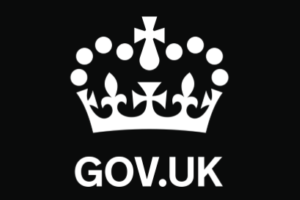Public Transport Support for Disabled People
Using public transport can be difficult and expensive if you have a disability. Here we provide information on how to find support services when travelling and discounts which may be available.
If you have a travel story to share with other beneficiaries, please get in touch with us using the form at the end of the page.
Trains
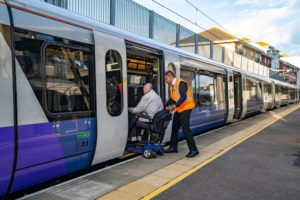 Disabled persons railcard (DPRC)
Disabled persons railcard (DPRC)
The Disabled Persons Railcard is for people with a disability that makes travelling by train difficult. The Trust has an arrangement with ATOC – Association of Train Operating Companies to help beneficiaries apply for a DPRC.
This can be done as follows:
- By Post – for those beneficiaries who prefer to apply for their DPRC by post, we can support you by sending you a letter confirming that you are a beneficiary of the Thalidomide Trust which you can send with your application form.
- On-line – for those beneficiaries who prefer to apply on-line, we can supply you with an individual code, which you can use to complete your on-line application.
If you would like to apply for an DPRC, please e-mail [email protected] or telephone 01480 474074.
There are other concessionary discounts on fares available for visually-impaired people or wheelchair users who do not have a Disabled Persons Railcard.
Find other concessionary discounts available from the Disabled Persons Railcard website
Support when travelling
Your rights and how to get help
All licensed train companies have an Accessible Travel Policy and must be able to tell you:
- what services and facilities are available
- how to get assistance - including when there are disruptions
Contact National Rail train companies before you travel to give advance notice if you will need assistance.
You can also find out what services are available at the stations you wish to use.
Wheelchairs
There are wheelchair spaces on mainline (intercity, suburban and cross-country) trains.
Helpful apps
If you need to book train assistance while on the go you can use the Passenger Assistance app. Find details of this and other helpful travel apps on our App Corner page.
Buses and Coaches
Bus passes
Disabled people may be eligible for a free bus pass in the UK. You can find out more and apply using these links for each country:
- England bus pass - apply with your local council
- Wales bus pass
- Scotland bus pass
- Northern Ireland bus pass
Coach travel discount cards
Some coach travel companies offer discount cards and assistance for disabled passengers. Find out about the discount and accessible services that they can offer:
Support when travelling
Your rights and how to get help
The law says bus and coach drivers must give reasonable assistance to disabled people, for example by helping them get on and off the bus or coach. This does not mean physically lifting passengers or heavy mobility equipment.
If you need help to get on and off a coach, you should ask for this when you book your ticket.
London bus and train travel passes and accessibility information
Freedom Pass
A Freedom Pass gives eligible people free or discounted bus and rail travel in London if your main residence is in London.
Find out more if you are eligible for the Freedom Pass
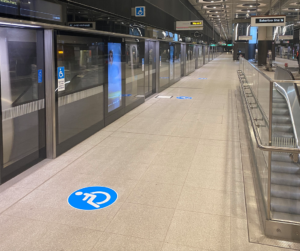 Travelling on the London Underground
Travelling on the London Underground
A newly published version of the Underground map now shows the stations in greater detail. Stations with disability access are marked on the map as well as whether they are overground or underground. There are currently different types of disabled access: Step-free access from street to train and Step-free access from street to platform, all of which are marked out on the map. There is a very handy "Step-Free guide" which shows you all of the routes you can take as well as an "Avoiding Stairs Tube Guide".
See the large print version of the whole tube map from London Underground
Helpful apps
You can access London Transport information and maps on the go using the Tfl Go app. It also gives details of station facilities and tells you where you can make step-free journeys. Find details of this and other helpful travel apps on our App Corner page.
Planes
If you will need help to travel on a plane you must tell the airline and airport at least 48 hours before travelling.
Airports may have different facilities or support arrangements so it is up to you to find out what is available before you book your travel.
The Civil Aviation Authority have more information on how to arrange special assistance for air travel.
Airports may have their own app with flight information, airport layout and facilities. Search online for the app for your chosen airport and download it before you travel for help while you are there.
Your rights and how to get help
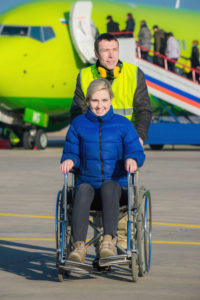 At the airport
At the airport
If you have a sensory or physical disability which affects your mobility when using transport, at airports in the UK and EU you have the right to:
- help at specific arrival points, such as at terminal entrances, at transport interchanges and in car parks
- help to reach check-in
- help with registration at check-in
- help with moving through the airport if you need it, including to toilets
- help to board the plane
You can travel with up to 2 items of mobility equipment free of charge if you’re disabled. This will not count as part of your baggage allowance.
On the plane
If you have a sensory or physical disability which affects your mobility on a flight, in the UK and EU you have the right to:
- get information about your flight in a way you understand it
- help to find a seat that is suited to your needs
- help to move around the plane, including to toilets
Wheelchairs - You cannot take your own wheelchair into the passenger cabin of a plane - it will be stored in the hold. Speak to your airline to find out what help they’ll provide when boarding.
Tell your airline, travel agent or tour operator as soon as possible if you’re taking on a battery-powered wheelchair or mobility aid.
You may need to travel with a companion - You must travel with a companion if you’re not self reliant, for example if you need help with feeding, breathing, using medication or using the toilet.
The airline you’re flying with will do their best to make sure you sit next to each other, so long as you tell them at least 48 hours before departure.
Travelling with an assistance dog - You have the right to travel with your assistance dog. You’ll need to follow the rules on pet travel.
Read Geraldine's story as she shares her experience of travelling on a plane
Taxis
It is against the law for taxi drivers to refuse to take you on a journey because of a disability or if you have an assistance dog. It is also against the law for them to refuse to book a vehicle for you due to these reasons. They may be fined up to £1000 or have their licence removed.
Your rights to help and assistance
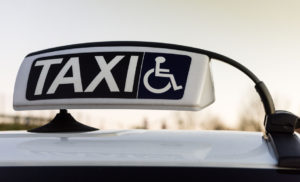 Drivers and taxi/minicab operators have to give you help to use their service. This could include:
Drivers and taxi/minicab operators have to give you help to use their service. This could include:
- help getting in and out of the vehicle
- help finding the vehicle
- putting a mobility aid in the boot
- reading out the total on the taximeter
- explaining what route they’re taking
They cannot ask you to pay extra for this help.
Note: Some drivers may be exempt from giving physical help if they have a medical condition. For example, if they cannot lift your mobility aid into the boot or push a wheelchair up a ramp.
Wheelchairs in taxis and minicabs
Licensed taxis in some areas (mainly cities) have to be wheelchair accessible.
To find out which taxis are wheelchair accessible near you you need to contact the taxi licensing department at your local council who have to keep a list of companies. Find your local council.
Cruise ships and ferries
If you will need special arrangements for seating or accommodation to travel, or help getting on and off a ship or ferry you must tell the cruise line or ferry service at least 48 hours before you travel.
Your rights and how to get help
You can get help if you’re disabled and travelling on any of the following:
- a cruise ship that’s leaving from a port within the UK
- a ferry that’s leaving from or going to a port within the UK
- a local ferry service, for example by river bus
Let the cruise line or ferry service know if you will be travelling with a carer. On a ferry service they may be able to travel free.
For more information read the Maritime passenger rights on the Gov.uk website
Getting a Radar key
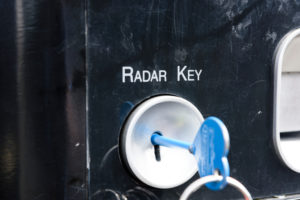 A Radar key allows disabled people to open locked accessible toilets all over the UK. Disabled toilets are commonplace and many places (including restaurants) are required to have them by law. However, they are often kept locked so that they can be used by the people they are intended for, which can be a problem if you can't find the attendant.
A Radar key allows disabled people to open locked accessible toilets all over the UK. Disabled toilets are commonplace and many places (including restaurants) are required to have them by law. However, they are often kept locked so that they can be used by the people they are intended for, which can be a problem if you can't find the attendant.
Having your own Radar key when you are out and about is a very good idea to make sure you can use them when you need to.
Find out more about the key and where you can buy one from from Which
Further information
Download our factsheet on alternatives to owning a car for additional information.
Download Alternatives to Owning a Car
Do you have a travel story to share?
If you have experience, good or bad, of travelling using public transport it would help other beneficiaries if you could share it. Please get in touch with us on the form below if you have a story.
